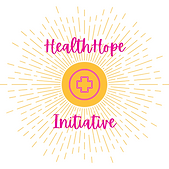PCOS Unveiled: Raising Awareness for Wellness and Understanding
- HealthHope Initiative
- Jan 11, 2024
- 4 min read
Updated: Jan 15, 2024
Authors: Hiba Farhan and Bhavyasri Pamudurti
What is PCOS?
PCOS is more than a medical term; it's a lived experience that touches the lives of countless individuals. Beyond this definition, this affects everyday life and profoundly affects mental, emotional, and physical health. In this exploration, we peel back the layers of PCOS, revealing the intricate stories, challenges, and causes regarding this condition. PCOS, or polycystic ovarian syndrome, is a hormonal condition that affects individuals with ovaries. Reproductive hormone imbalance is its defining feature, which can result in a range of symptoms and even complications. This can be problematic to manage as it creates irregular menstrual cycles, complications with fertility, hormonal imbalances that cause physical symptoms, a higher risk of metabolic problems, along with negative effects on mental health. To address these issues, early identification and treatment are essential. Come along as we explore the complicated nature of PCOS, aiming to comprehend not just its medical elements but also to elevate the experiences and narratives of individuals facing its obstacles.
Understanding PCOS
This syndrome has been the cause of many life-altering symptoms and illnesses in the lives of women who live through it. It is shown through various types of symptoms, and because of the lack of research, all of them have yet to be identified. Some of the more common ones are irregular periods, abnormal hair growth, acne, obesity, cysts, darkening of the skin, skin tags, hair thinning, and infertility. It is also highly likely that women with PCOS will deal with certain pregnancy complications. It is also possible to have this condition but not experience any symptoms at all. Some of the main causes include higher levels of male hormones called androgens, insulin resistance, and low-grade inflammation. Unfortunately, this illness does not have a cure, but there are many treatments used to keep it under control. For women who don't plan on getting pregnant, the best treatments are hormonal birth control, insulin-sensitizing medicine, and medications to block male hormones (androgens). For women who want to get pregnant in the future, the best treatment options are drug-induced ovulation, surgery, and IVF (In Vitro Fertilization). PCOS is a condition that reveals itself in different ways for everyone, so when dealing with it, it's best to find the best treatments that work best for you.
Personal Stories
When it comes to PCOS, every woman’s experiences and challenges are different because it is a disease that differs based on a person's body. It is a prevalent disease in women, but because of the lack of research, over 70% of women affected worldwide remain undiagnosed. Many can develop this as young as 10 years old and leads to a variety of long-term health problems. One woman who goes by the name Kate shared her experience and struggles with PCOS throughout her life. She expresses how her mom had noticed symptoms in her as early as 3rd grade, although she got diagnosed in high school. She ignored the diagnosis because her doctor assumed it was because she had a bad lifestyle. She had experienced symptoms such as excessive hair growth, irregular periods, and fertility issues. The biggest symptom she faced was her excessive weight gain. After years of trying to lose it, she underwent gastric bypass surgery. After almost a decade of suffering the symptoms and doctors not being able to figure out what was wrong, she was intermittently admitted to the hospital due to rectal bleeding. Even then, for the next 7 years no doctor could find the solution and most of the time told her it was all in her head. Because of complications in her gastric bypass surgery, she was living in constant pain and ended up developing POTS (Postural Orthostatic Tachycardia Syndrome). This made her life increasingly difficult, as she could not work and had given up hope. Finally, she found a doctor who had figured out and corrected the complications of her surgery and helped her find solutions to maintain her syndrome. This woman's story goes to show just how many other women around the world are suffering from this condition, yet have not been diagnosed or found a solution due to the lack of information and funding for its research.
Beyond the Clinic
In a broader sense, the comprehension of PCOS has expanded beyond the clinical setting and into the depth of individual experiences. The complexities have emerged as we've uncovered its background, associated problems, and underlying causes. Kate's personal story sheds light on the challenges that many women encounter, underscoring the need for greater financing and awareness of these issues. Due to its wide range of symptoms and lack of a cure, PCOS requires specialized care techniques. In addition to raising awareness of the medical elements of PCOS, our goal is to highlight the resilience and bravery of those dealing with the condition. The road ahead includes resolving issues, building a supportive community, and ensuring that every voice affected by PCOS is acknowledged and valued.
Citations:
Cleveland Clinic medical professional. “PCOS (Polycystic Ovary Syndrome): Symptoms & Treatment.” Cleveland Clinic, my.clevelandclinic.org/health/diseases/8316-polycystic-ovary-syndrome-pcos. Accessed 11 Jan. 2024.
G , Kate. “Kate G.: Beyond My Personal Battle with PCOS, Pots and ‘Candy Cane’ Syndrome.” Beyond My Battle, Beyond My Battle, 13 July 2021, www.beyondmybattle.org/blog/kateg?gad_source=1&gclid=Cj0KCQiA67CrBhC1ARIsACKAa8Q0PpOHql5o97RCpvijZcSHLBAUo1gBDS7oR5bA9jCRCVIF9qRuCDAaAtEiEALw_wcB.
“My PCOS Story – Heartland Community Health Center.” Edited by Heartland Community Health Center, My PCOS Story – My Journey with PCOS Began in My Early 20s. After Years of Taking Hormonal Birth Control, I Decided to Switch to an Intrauterine Device (IUD). A Few Months Later I Began Noticing Some Unusual Symptoms, Which I Assumed Were Side Effects of the IUD. These Symptoms Included..., 6 Sept. 2023, heartlandhealth.org/2023/09/my-pcos-story/.
“Polycystic Ovary Syndrome.” Edited by World Health Organization, World Health Organization, World Health Organization, www.who.int/news-room/fact-sheets/detail/polycystic-ovary-syndrome#:~:text=Polycystic%20ovary%20syndrome%20(PCOS)%20affects,a%20leading%20cause%20of%20infertility. Accessed 11 Jan. 2024.




Comments